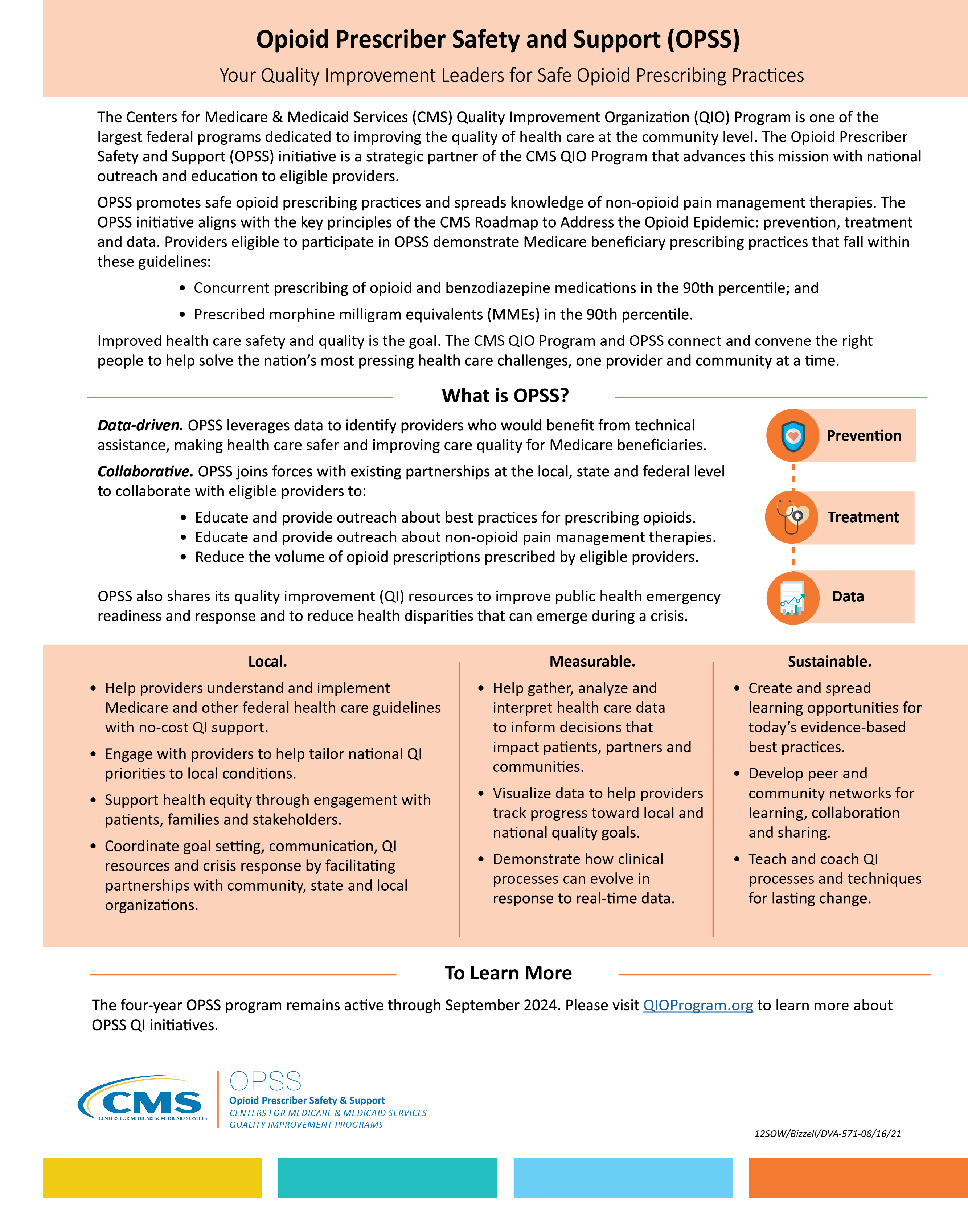
The Opioid Prescriber Safety and Support (OPSS) initiative is part of the Centers for Medicare & Medicaid Services (CMS) Quality Improvement Organization (QIO) Program and is led by the Iowa Healthcare Collaborative (IHC). Through its Compass Opioid Stewardship Program (OSP) IHC supports eligible clinicians through education and outreach to improve prescribing practices and increase the use of non-opioid pain management therapies for people with Medicare. Eligibility in the program is determined by CMS, who provides IHC with an annual list of eligible clinicians. Currently there are 257 providers across 37 states enrolled in the OSP program. Clinicians have demonstrated widespread success through participation in this program. As an example of success, one clinician who has been enrolled in the program for six months reduced their opioid prescribing from over 700 opioid claims per month to 200 per month. Based on individual provider baseline and performance data for all enrolled clinicians from October 2020 through January 2023*, the program’s overall successes include:
- 22,937 fewer opioid claims
- 8.71% reduction in opioid claims
- 62.25% of enrolled providers demonstrating some degree of improvement (measured by a percent improvement) in prescribing
- 13,736 fewer beneficiaries receiving opioids
IHC targets the top 10 percent of opioid prescribers in each state for participation in the OSP. But enrolling these outlier prescribers, keeping them enrolled and collecting self-reported data is challenging.
Keys to Success
IHC’s team of clinical improvement consultants, physicians and pharmacists provide training, educational resources and customized coaching to clinicians. IHC develops specialized approaches for clinicians facing challenges accessing the community-based resources they need to achieve their goals. IHC also provides each clinician with a detailed data dashboard highlighting trends in prescribing, developed using claims data to create an individualized plan for success and help monitor their progress.
IHC provides multimodal education and feedback on current prescribing methods to help clinicians establish attainable goals to reduce their opioid prescribing. Clinicians learn about evidence-based communication techniques, such as motivational interviewing, and taking a patient centric approach to care delivery, which helps them better communicate with and involve patients in their own care. One of the biggest drivers of success has been teaching clinicians how to develop customized treatment plans and providing education and support surrounding management of chronic opioid therapy patients.
Resources such as the IHC Compass Prescribing and Treatment Guidance toolkit offers strategies that help clinicians limit new opioid prescriptions, optimize non-opioid pain management strategies, reduce risk and harm for patients on chronic opioid therapy and diagnose and treat patients struggling with opioid use disorder.
For more information, visit the IHC website.
*Data demonstrates results from October 2020; Opioid Prescriber Safety and Support (OPSS) Task Order, IHC Executive Summary, January 2023
This material was prepared by The Bizzell Group (Bizzell), the Data Validation and Administrative (DVA) contractor, under contract with the Centers for Medicare & Medicaid Services (CMS), an agency of the U.S. Department of Health and Human Services (HHS). Views expressed in this material do not necessarily reflect the official views or policy of CMS or HHS, and any reference to a specific product or entity herein does not constitute endorsement of that product or entity by CMS or HHS. 12SOW/Bizzell/DVA-1144-07/18/2023

